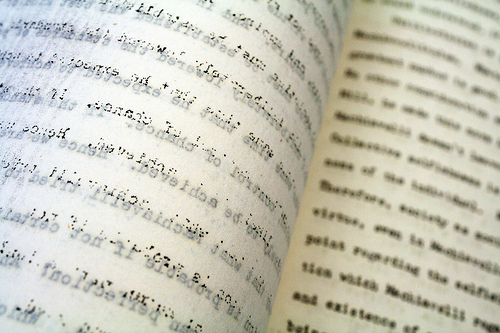Powerful Words Tomorrow

Chasing Meaning: Words Today Can Have Added Power Tomorrow
Words can have a life of their own. They’re not just tiny type on dictionary pages. Words can be strong and bold (such as “humongous”). They can also be vague, almost lazy (such as “whatever,” especially when spoken by a teen!). Sometimes, they can evolve into something much bigger than a set of symbols on a printed page.
Take occupy. It’s a pretty average word, meaning to take up space or to hold space by force, as in a military context. But in 2011, it became a celebrity. It got a capital letter and christened a movement, as in “Occupy DC.” And then it became the vocabulary equivalent of “American Idol”: Occupy was voted the 2011 Word of the Year by the American Dialect Society, the 122-year-old organization whose work illustrates how language change is normal, ongoing and often entertaining.
Anyone who plays Scrabble or Words With Friends knows the pleasure of putting down that perfect combination of tiles that links one word to another. But think about it: many of the words we use in daily discourse only recently became “legal” in word games. They’re recent arrivals to the language (“geek,” “nerd”) or they’re trade names we’ve made into names of objects (“Kleenex,” “Xerox”). Other words have acquired new meanings (“rap,” “chops,” “hunk”). Language moves with the times, and your language proficiency – written and oral – should move with it!
The first runner-up for word of the year in the American Dialect Society 2011 competition was a wonderful acronym, FOMO. Standing for “fear of missing out,” it describes anxiety over being inundated with information on social media. Another runner-up was “humblebrag,” an expression of false humility. And, just as in high school, there was a vote for most likely to succeed: That word is “cloud,” the online space for the large-scale processing and storage of data.
Some former words of the year don’t have staying power. “Y2K” in 1999 and “chad” in 2000 “are examples of prominent terms that faded quickly,” the Society says. The word of the decade, still going strong, was “google.” This isn’t a new pattern, check out top words from previous years.
For creative assistance with your own words, contact us at Communication Research Associates. We support leaders in business, academe and non-profit organizations in the crafting of messages for the public and the media. Whether it’s composing original material or editing yours, or preparing you to deliver your story in person, we can transform words into your own words of the year!
Stories:
